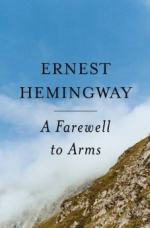|
This section contains 7,025 words (approx. 24 pages at 300 words per page) |

|
SOURCE: “Hemingway's A Farewell to Arms: The Novel as Pure Poetry,” in Modern Fiction Studies, Vol. 14, Autumn, 1968, pp. 283-96.
In the following essay, Schneider compares A Farewell to Arms to a lyric poem, where plot, character, and images all contribute perfectly to a feeling of hopelessness and desolation.
In a well-known essay1 Robert Penn Warren has drawn a distinction between two kinds of poetry, a “pure” poetry, which seeks more or less systematically to exclude so-called “unpoetic” elements from its hushed and hypnotic atmosphere, and an “impure,” a poetry of inclusion or synthesis, which welcomes into itself such supposedly recalcitrant and inhospitable stuff as wit, cacophony, jagged rhythms, and intellectual debate. The distinction between the two types, so helpful in the analysis of lyrics, may obviously be employed to advantage in the criticism of novels, and I should like to use it here to call attention to an...
|
This section contains 7,025 words (approx. 24 pages at 300 words per page) |

|


